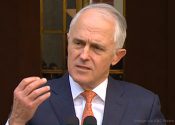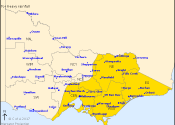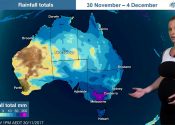
CHANGES to the Clean Energy Finance Corporation have industry leaders warning household solar could become more expensive, but local political figures are divided on the potential impact.
First published in the 24 July 2015 edition of the Warragul & Baw Baw Citizen. Get your copy free from retailers across Baw Baw today.
The federal Liberal government has directed the government-owned CEFC to cease investment in wind energy and and rooftop and small scale solar.
ADVERTISEMENT
Australian Solar Council CEO John Grimes has labelled the move as destructive and having the potential to most impact low-income earners and retirees whose household solar installations would be supported by the CEFC.
“[Prime minister] Tony Abbott is keeping people trapped paying higher electricity prices,” Mr Grimes told Fairfax media.
But local Liberal MP Russell Broadbent has replied by saying household support has not been changed.
“The support provided for household and small scale solar PV remains unchanged,” Mr Broadbent told the Warragul & Baw Baw Citizen.
“The Coalition government is a strong supporter of renewable energy, including small-scale household solar.
“Currently there are more than 1.4 million households, small businesses and community organisation with solar PV installations. This is in addition to around 900,000 solar hot water systems.
“Put simply, more than 2.3 million Australian households, small businesses and community organisations have invested in solar systems. This investment has been underpinned by the Renewable Energy Target scheme. Under the scheme, those installing solar PV are now receiving, on an average sized installation, more than $3,000 in rebates.
“This is equivalent to about 30 per cent of the total cost of installation.
“The Clean Energy Finance Corporation has received $1.4 billion in finance from taxpayers since its inception. The Government believes that the CEFC should return to its original objective of focusing on new and emerging technologies, rather than using taxpayer’s money to fund well-established technologies, such as small-scale solar, which are better provided by the private sector.”
ADVERTISEMENT
Not so, according to Labor’s candidate for Mr Broadbent’s seat of McMillan Chris Buckingham.
“The CEFC was created to facilitate a financial market for investment in renewable energy, which creates jobs, drives investment and reduces carbon pollution,” he told the Warragul & Baw Baw Citizen.
“The Abbott Government’s move to limit the scope of the CEFC is an overtly political move that makes a mockery of the well-established principles used to establish the CEFC in the first place.
“In the 2013-2014 financial year, the CEFC invested $900 million in Australian renewable energy projects, attracting an additional $3 billion in private investment.
“These projects have employed thousands of people, billions of dollars of investment and supported the development of Australia’s renewable energy industry.
“The loans provided by the CEFC are being paid back to the government at a rate of seven per cent, making money which is returned to the budget bottom line.
“It makes no sense to limit the scope of a successful organisation that is clearly delivering good outcomes.”
The suggestion wind and solar are established technologies is only partially correct, according to Mr Grimes.
“Wind and solar are established technologies but they are not mature in terms of financing,” he told The Saturday Paper.
“This is what CEFC can do – create innovative financial mechanisms for investment.
“If Abbott continues this way, we’re finished. We know that solar and other renewables are competing with coal, and Abbott is intent on protecting that industry. So, this is our WorkChoices moment. We will be mobilising and… campaigning in marginal seats.”
A spokesperson for Mr Broadbent declined to comment on whether any constituents had approached the MP about the issue, but Mr Buckingham said the electorate was concerned.
ADVERTISEMENT
“Climate change is a big issue in McMillan,” Mr Buckingham said.
“People are very concerned about the impacts of carbon pollution on our environment. They are frustrated by the federal government’s lack of leadership and commitment to practical measures that will enable our local economy to make the transition.
“We cannot afford to stick our heads in the sand. Our region needs investment in renewable energy because it will deliver vital social, economic and environmental dividends.
Mr Broadbent did not say if he had been supportive of the decision to direct the CEFC within his party.
Asked if he believed driving investment in established renewable energy was something for the public or private sector, Mr Buckingham said it was an issue for all.
“Business, community and government must work together to come up with the solutions for climate change,” he said.
“Building the renewable energy sector is a shared responsibility. We need to advocate for investment in renewable energy across the electorate and use it as a lever for generation of real jobs.”
Mr Broadbent said the Renewable Energy Target, which was introduced by the Howard Liberal government and recently lowered by both the Liberal and Labor parties, was what drove solar investment.
“Recently there were some changes to the RET passed by the parliament,” he said.
“These changes mean the legislated proportion of Australia’s electricity supplied by renewable sources will be more than 23.5 per cent by 2020.
“That’s a doubling of renewable energy, in all forms, over the next five years.”
It seems the Labor party has had a change of heart on the reduction – the party has announced that, if elected at the next federal election, it would legislate to require half of Australia’s electricity be generated from renewable sources by 2030.
The present target is 23.5 per cent by 2020, and the Australian Greens’ target is for 90 per cent renewables by 2030.
More details of the plan are expected to be unveiled at Labor’s conference this weekend.
A recent poll of Australians’ attitudes toward global issues conducted by the Lowy Institute showed over half would accept “significant costs” in fighting climate change.
Read articles referenced in this story
Government pulls the plug on household solar – The Sydney Morning Herald: goo.gl/uSLQgc
Abbott’s campaign to kill renewable energy sector – The Saturday Paper: goo.gl/eXKCnx

One response to “Changes could put household solar out of reach”




















I’ve had installed 5 KW solar system on my house My Rebate was taken by the installer and as part of the payment .It Cost me & my wife about $6000.00 and i only get 8 Cents per KW of my bill for what i do not use,yet i pay the top price for any extra .and the Electric company gets top price to sell my electricity to someone else.************AAA
we are getting taken for a ride and no one cares or douse anything about it.
Fair Go Australia ,we put Good money into our Country and what do we get Back ??? A Slap in the FACE.
We put all modern items in the house like LED Lights ,Air-con with Inverters,Microwave with Inverter,Instant Gas Hot water only comes on when used, Insulation in roof and around House,
SO WHAT HAPPENS, THE PRICE OF ALL POWER AND GAS PRICES ,Water ,Parks and Gardens added to bill not to mention Rates,Phone ,and supermarkets Groceries. GO UP.
THANK YOU AUSTRALIA GIVE OUR PARLIAMENTARIANS ANOTHER RISE WHO CARES .